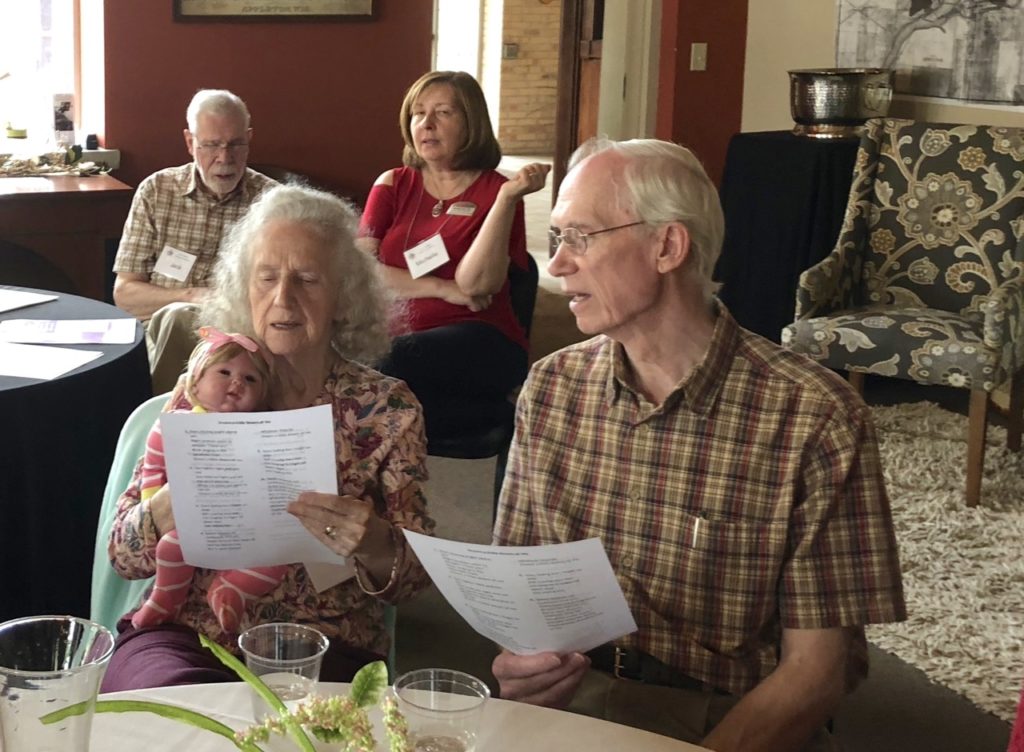Connected in Caring
Posted in General | Tagged in beth belmore, caregiver, caregiving, fox valley memory project, dementia, alzheimer's, dementia fox valley

A gentleman who is providing full time care for his wife who is experiencing moderate memory loss recently asked me how he would ask and accept assistance. He says when he thinks about finding support, he immediately stops because he tells himself that he should be able to do this himself and would see himself as a “mooch.” Those messages or self-talk that are ingrained in us are hard to recognize and can be even harder to change.
If you think about it, the message he is giving himself hasn’t changed even though his spouse’s condition and needs have dramatically in ways neither of them would have ever anticipated. She requires hands on care and supervision now and he continues to see himself as the only person who can provide her care.
Unfortunately, this is not an unusual situation in the life of a person with advanced memory loss and nor an uncommonly held belief by a family caregiver. Many not only believe they should provide all the care, but also believe that they are the only ones who can and who do it as well. It is one of the contributing factors to stress, burnout, depression, and other illnesses for the person providing the care. Roughly 30% of caregivers die before those they are caring for! No one in these situations wins when the caregiver “flies solo.” Caregiving, or for all practical terms, being human is not a solo activity.
I am more frequently encouraging caregivers I am honored to work with to think about their own support circles and at times put them on paper to create a visual of those close to them. It is all about relationships, and seeing those close to you as you draw them out serves many purposes. It helps to consciously identify our relationships. It refreshes our gratitude for the people who are a part of our lives and for the gifts they bring to enrich our lives. Expressing that appreciation is mutually beneficial and gives that person a chance to appreciate you, too. It may be a clear visual of the fact that you wish to cultivate more relationships or re-connect with some that have become distant. You get to decide how you travel on this two way street of your relationships. It really is a two way street and the relationships vary in what they mean to you—the beauty of them is that different people in our lives bring different aspects. The people may appear a bit further out in your visual because your contact is less frequent or your friendship newer. In my own support circle picture (which I re-do on paper every year), I put family, friends, neighbors, co-workers, my spiritual supports, pets, my primary doctor, and even places. All play different roles in my life and vice versa. I wouldn’t expect my longtime, out-of-state friend of over 35 years to provide my healthcare, but in many ways she contributes immeasurably to my well-being. The person who cuts my hair is only occasionally in my life, but I’d don’t want to think about replacing her. It is great to see those folks in your circles all centered on you! I am not in this life alone.
You, the caregiver, can also use (and I mean “use” in the most healthy sense of the word) your support circle to help you identify those who may be there to assist you and your family member. The two circles will have some overlaps but each will also have some distinct relationships, too. Remember they also have a support circle and while there is some overlap, don’t forget the people who may be uniquely their relationships. You can ask for help and the more specific you are, the better results you will receive.
One caregiver who has taught me many things as she has shared her journey has become quite adept at not only recognizing the support circle for her spouse who now has significant memory loss, but also for herself. She has become so good at reaching out for support for herself and for him to ask in very specific ways that are easy for those who are connected to them to respond. Example: she recently experienced her own injury which caused her to be temporarily immobile. She sent an email to some members of her circle to alert them of her injury. They responded with offers to
help and she followed up with specific requests, such as, “Could you come on Monday or Thursday evening to bring dinner and keep us company?” This allowed those who wished to, know how and when to most effectively be of support.
She also has suggested, “He needs to go out on Tuesday from 9:00-noon.” Old and new folks in his circle have responded, giving him needed stimulation, her planned respite, and all have been that much richer for the experience. Engaging those in your circle builds on your meaningful relationships, gives them an opportunity to give to you, in many cases, repay or pay forward kindness, with a mutually beneficial effect.
I’d like to share a quote from a very wise woman, former First Lady, Rosalynn Carter,
“There are four kinds of people in the world: Those who have been caregivers, those who currently are caregivers, those who will be caregivers, and those who will need caregivers.”
That quote has always reminded me that we are all connected in caring. It is not taking advantage of, nor “doing less than” in reaching out to those in our circles of love and support.
Beth Belmore
Leave a Reply